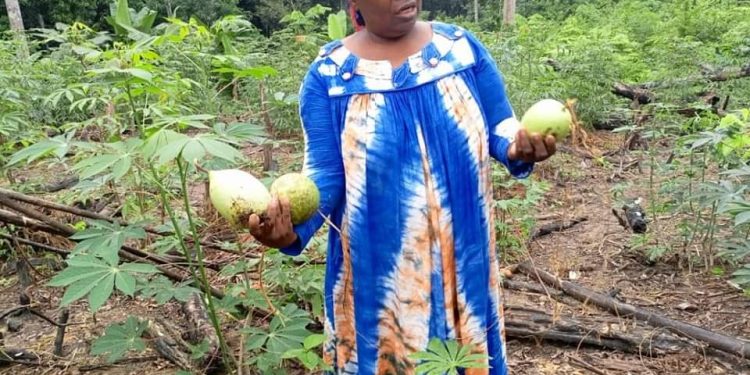Story, Louvier Kindo Tombe
Mama Victorine did not go to the farm that morning of July 30th 2024, because the women of AFRiSC Campo were to hold an important meeting with some of their partners. When we arrived her compound in Malaba, a village in Campo sub division, Ocean division of the South region of Cameroon, she was singing songs of joy as she spreads her harvests on the ground in front of the house. The yields from her Egusi (melon) farm were bountiful.
“I have never seen such a harvest; the seeds we received did extremely well,” says Mama Victorine.
The woman in her early 60s is just one of the members of AFRiSC Campo who witnessed great yields during the 2024 farming season thanks to seeds received from various civil society organizations in Cameroon.
Green Development Advocate (GDA) played a significant role in giving the women the opportunity to attend community seed fairs where traditional/local seeds are exchanged.
A variety of plants and animal seeds were handed over to AFRiSC women including but not limited to maize, Groundnuts, cassava, beans, plantain, yams and chicks.
The idea was on one hand to revive certain agricultural products that did no longer exist in the different villages like red yams, and on the other hand, improve on existing harvests.
According to farmers in Campo, some agricultural practices had died due to lack of seeds. One of the farmers told News Upfront that “most of the seeds were consumed during periods of poor harvests and some never existed in the locality because the people of Campo lived on hunting and collection of Non Timber Forest Products”.
The concern given to agriculture today in Campo and other forest localities is due to the fact that hunting activities have witnessed a serious setback with the protection of rare species and the restriction of the riparian population from having access into protected forest areas and National parks which now surrounds their villages.
“We are glad with the introduction of poultry farming here in Campo because it will help us eat animal products which have become rare,” a farmer in Nkoelon – Campo said.
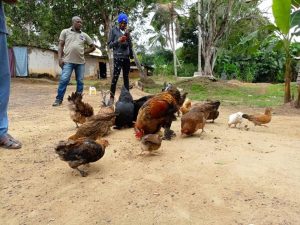
Those who received the seeds in Campo did well to multiply them and share with others who were not opportune. “By this same time next year, each household in Nkoelon must have received a chick for poultry farming”, another farmer who is multiplying the seeds said.
Women as key actors in seeds conservation
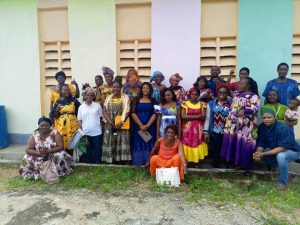
Since the introduction of improved seeds in Campo, the women have been playing a significant role in its conservation.
“We try as much as possible to avoid exposing the seeds to extreme temperatures and we store them away from moist environment,” Mama Menye Celine, member of AFRiSC Campo, and expert n seed conservation said.
The women have been trained on seeds conservation and advanced farming technics, but they can’t operate alone without support from the men who are mostly responsible for clearing the farms.
In Campo, it is the woman who selects best seeds from the harvests; she is responsible to conserves it until the next farming season when she will still lead the process. “We have learned to space out our crops for better yields, which is what our parents didn’t do in their days,” Mama Victorine said.
“All these are thanks to assistance from GDA and other civil society organizations.” “If GDA leaves today, we will never forget them for their works.”
Agriculture in Campo is bouncing back on a good footing but not without challenges, especially as human wildlife conflicts are gaining grounds in the locality.
Helpless efforts to counter animal attacks in farms
The efforts put in by Campo population in agriculture is yielding fruits just that the fruits of their labour are enjoyed by wild animals from nearby forests and parks. The animals attack and destroy crops in farm almost on a daily basis. It has generated a human-wildlife conflict in the localities.
“We are preys in our own communities,” says her Majesty, Evina Ango Irene Honorine, the traditional ruler of Akak village in Campo.
Squirrels, Monkeys, Antelopes, Chimpanzees, Gorillas, and elephants are some of the common animals causing havoc on agriculture in Campo.
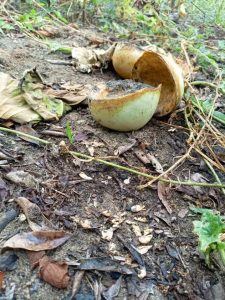
All efforts to push the wild animals away from the farms have been in vain. The populations have tried bee farming, planting of lemon trees, setting of bush fires at nights just to scare away elephants but to no avail.
“The first day I lit fire in my farm, that same night, elephants destroyed the entire crops in the farm,” a farmer recounted with regrets.
Way forward
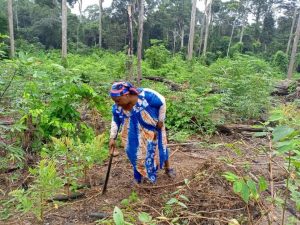
Human wildlife conflict is real in Campo like in other forest areas in Cameroon. The government is struggling to mitigate the situation, but according to the riparian population, certain basic actions need to be taken in order to permit them excel properly in agriculture which is undoubtedly the better option for their livelihood at the moment.
“Large scale group farming with protected boundaries will enable the population to have good harvests since efforts will be concentrated in one area to face the wild animals,” says Her Majesty Evina Ango Irene Honorine.
The women of AFRiSC Campo were unanimous that follow up to the improved seeds distribution and agricultural practices should be made regularly. A team from GDA it should be noted recently carried out an evaluation of the seeds distribution project in Campo. Despite the few challenges presented by the population, their appraisal was positive.
Agriculture in Campo is still at the level of household and not every family has embraced it. One of the challenges is finances. That explains why Green development Advocate has planted a financial seed at AFRiSC Campo where the sum of FCFA 500,000 has been given to the association to manage and help members to boost their yields.
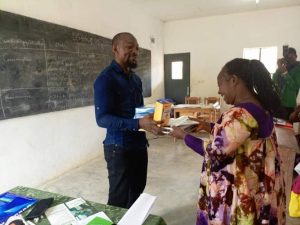
Besides the financial package, GDA equally trained the women on “developing and evaluating micro projects”
The women of AFRiSC Campo after receiving the amount from GDA praised the organization for always coming to their aid and indicated that the amount would go a long way to take them out of poverty.
